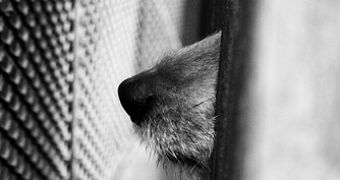Dogs, wolves and coyotes can suffer from a contagious form of cancer, that seems to repair its own genetic mutations by adopting genes from the host, revealed a new study carried out by scientists at Imperial College London.
Canine Transmissible Venereal Tumor or CTVT is a very special form of cancer that is usually transmitted by mating, but can also spread by biting, licking or sniffing tumor-affected areas.
The cancerous cells move directly from dog to dog, and as they infect the animal, they adopt a parasite-like behavior.
CTVT can be found in most canine breeds worldwide, and scientists believe that it is very similar to the transmissible but more deadly cancer seen in the endangered Australian Tasmanian devil.
ICL scientists estimated, in an earlier research, that the first CTVT appeared in an ancient dog or wolf, some 10,000 years ago, maybe during the time that the first dogs were domesticated through inbreeding of the more social wolves.
The results of this last study show that over this period of time, this type of cancer must have developed the ability to capture mitochondria from its host animal.
The researchers found out that the cancer survives by stealing mitochondria from the cells of the infected animal and incorporating them as its own, and this could be because genes in the tumor's own mitochondria tend to mutate and degenerate, so they must be replaced.
This is rather unexpected because the normal passage of mitochondria and their genes is made from a mother to her offspring.
Mitochondrial transfer between genetically different cells has previously been observed in the laboratory, but this is actually the first time anyone has roof that it occurs in nature.
These findings could be crucial for stopping the spread of similar diseases in other animals, as well as for understanding the progression of cancer across species.
At first, Dr Clare Rebbeck, formerly a PhD student on the project at Imperial College London, now working at Cold Spring Harbor Laboratory in the USA, wanted to use computer analysis of DNA samples, to see how cancers from different parts of the world were related to one another.
The thing was that her research proved that the pattern of relationships for the mitochondrial genes was different to that of the nuclear DNA, and even that, in some cases, the cancers were more similar to their hosts.
This finding is what pushed the researchers to believe that some cancers took mitochondria from their hosts.
“Our study has revealed that this type of cancer works in a really unexpected way,” said Professor Austin Burt from the Department of Life Sciences at Imperial College London, leader of the research.
“It raises some really important questions about the progression of other cancers, such as how they repair their own DNA.”
The CTVT mitochondria loses productivity very often, because of the naturally high rate of genetic mutations which leads to non-functional genes, so the researchers concluded that the cancer doesn't take new mitochondria every time it infects a new host, but it rather uses this mechanism to fix faulty ones, when it is necessary.
The scientists hope their work will be useful in finding out more about cancer progression in humans and other animal species.
This new study was published in the journal Science.

 14 DAY TRIAL //
14 DAY TRIAL //